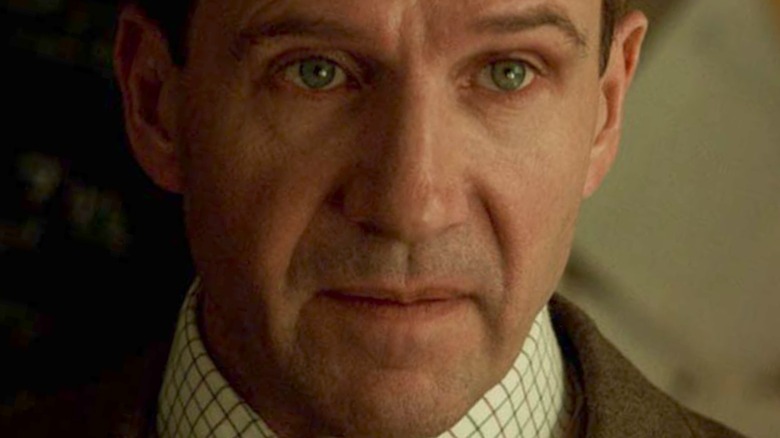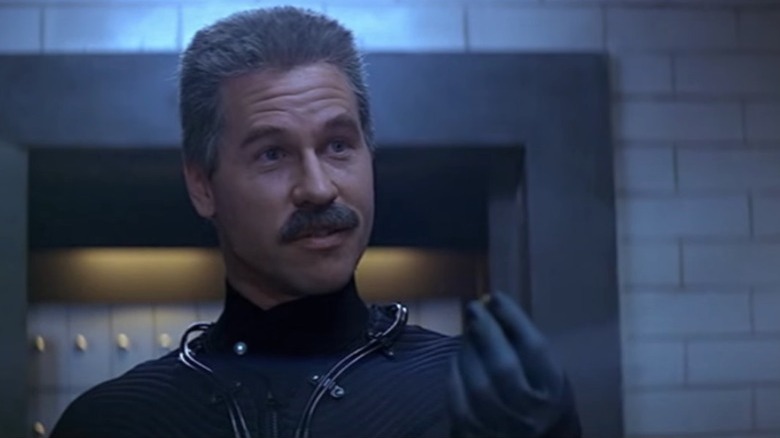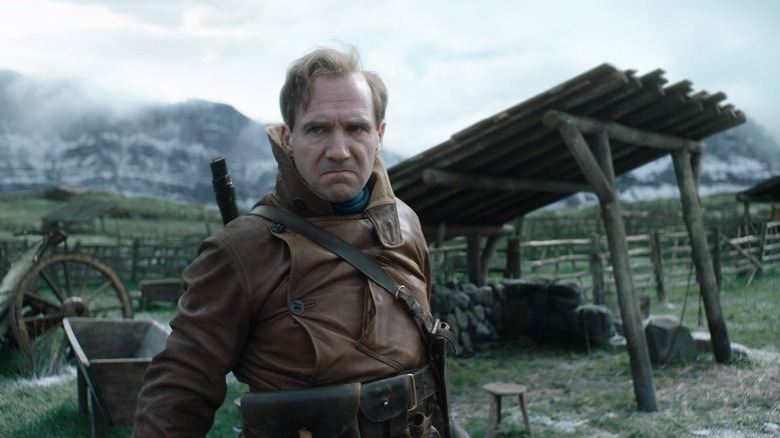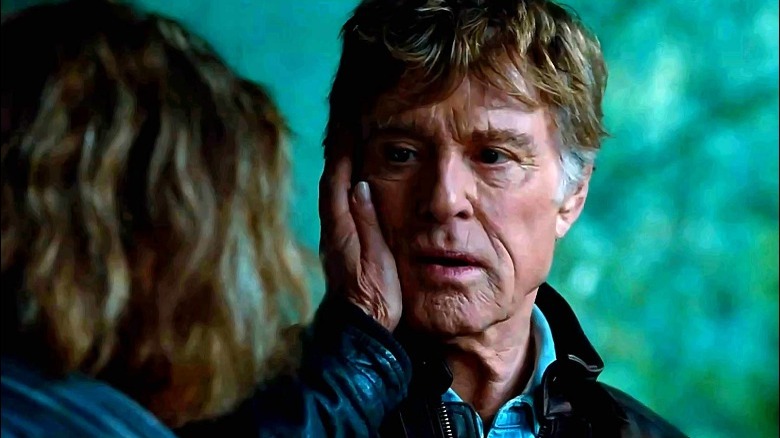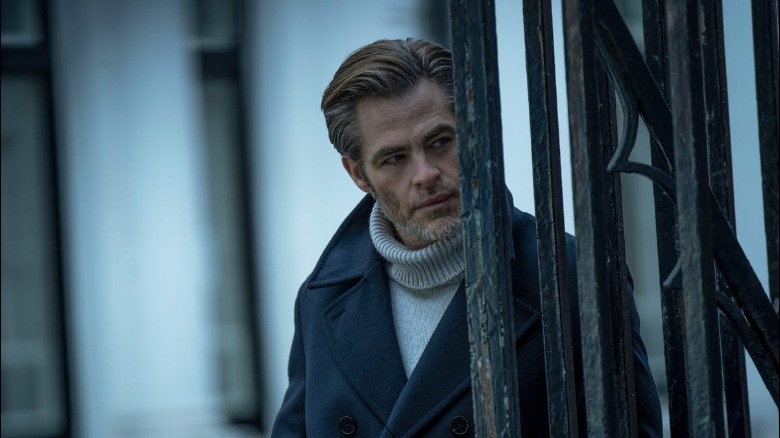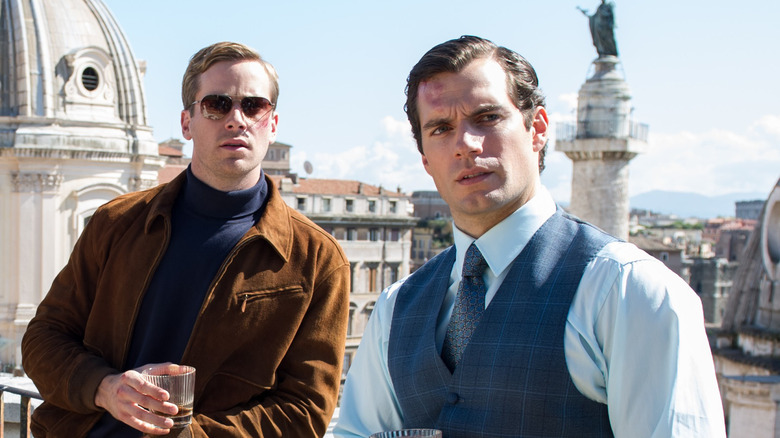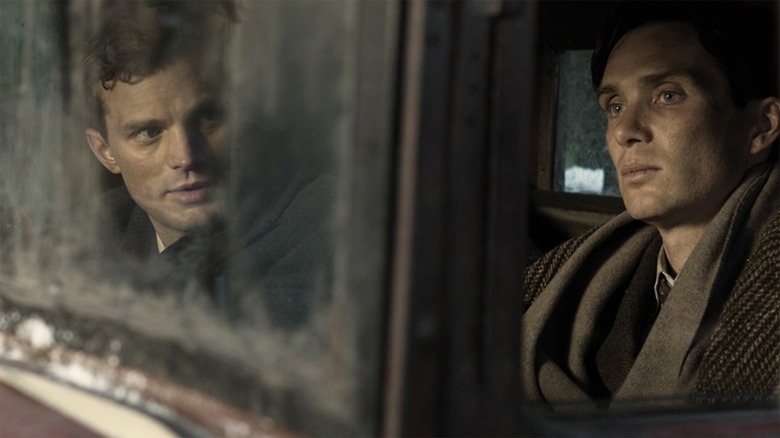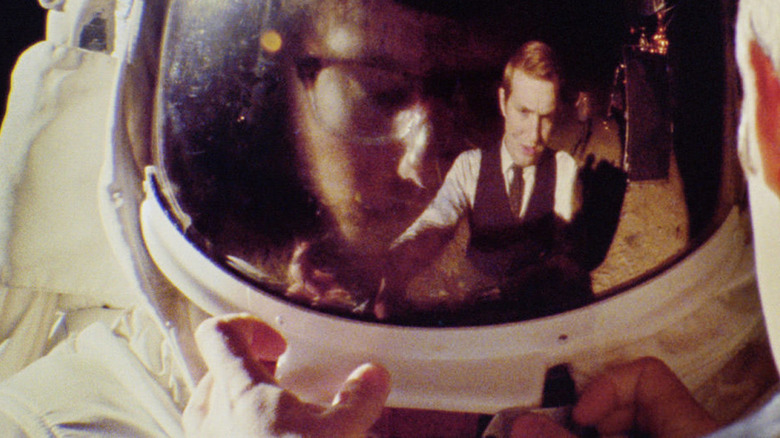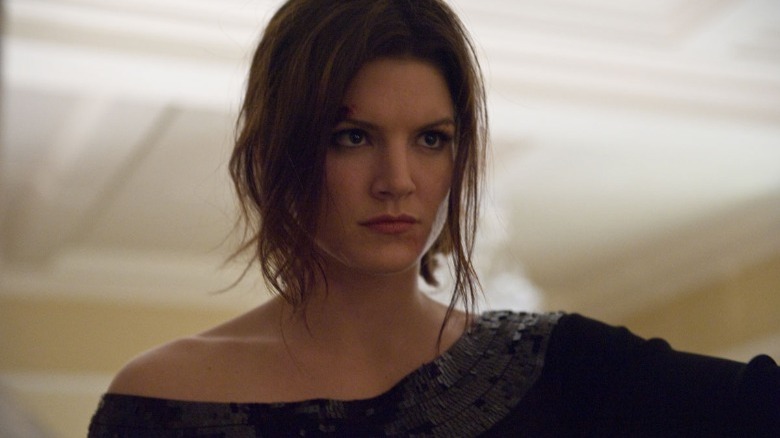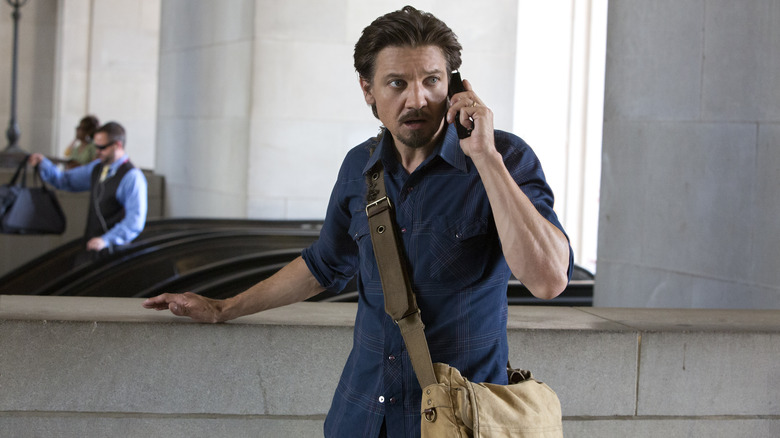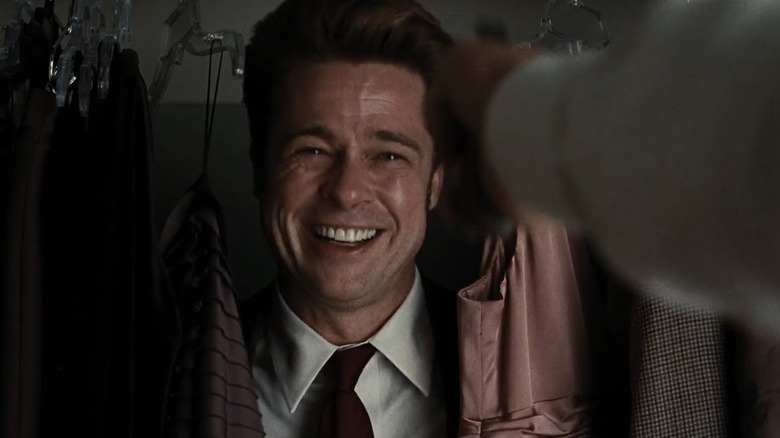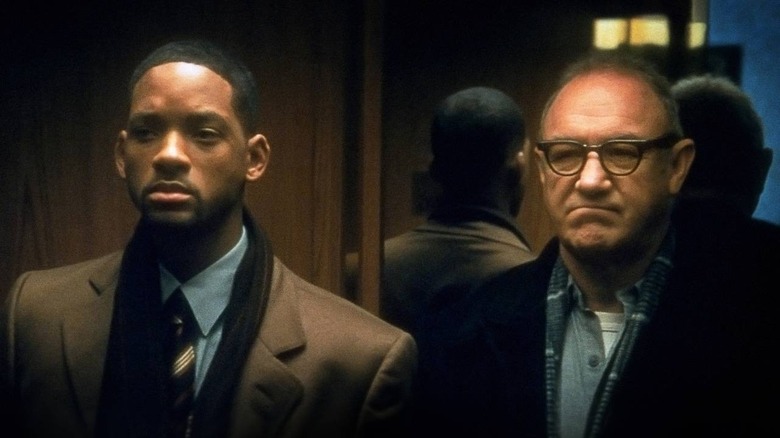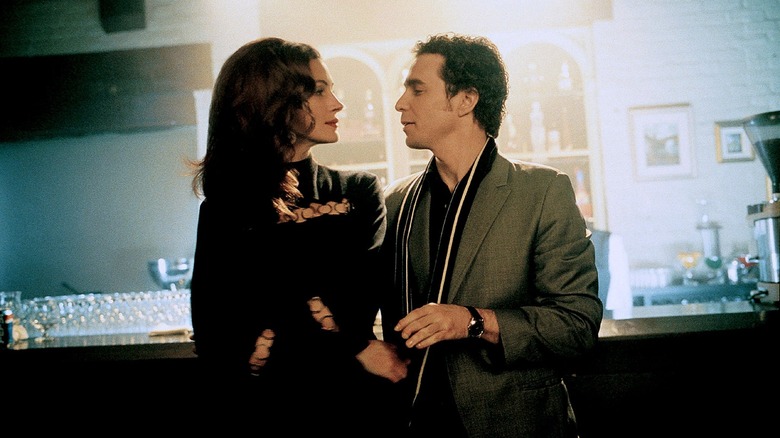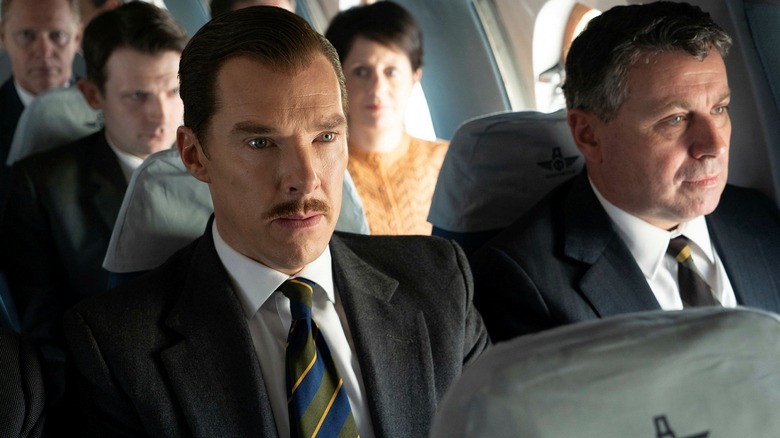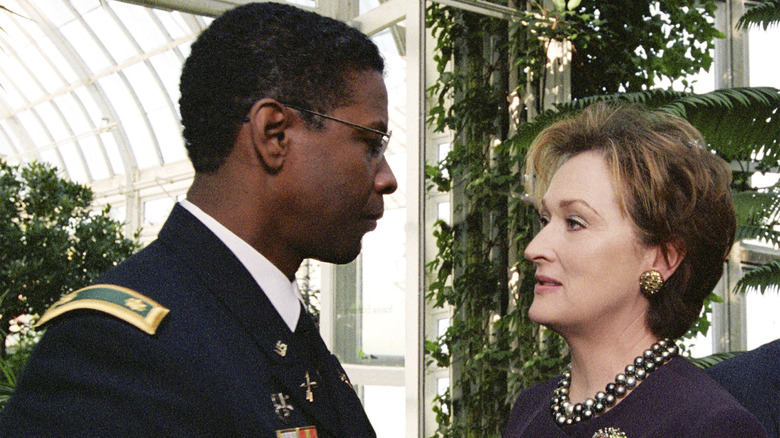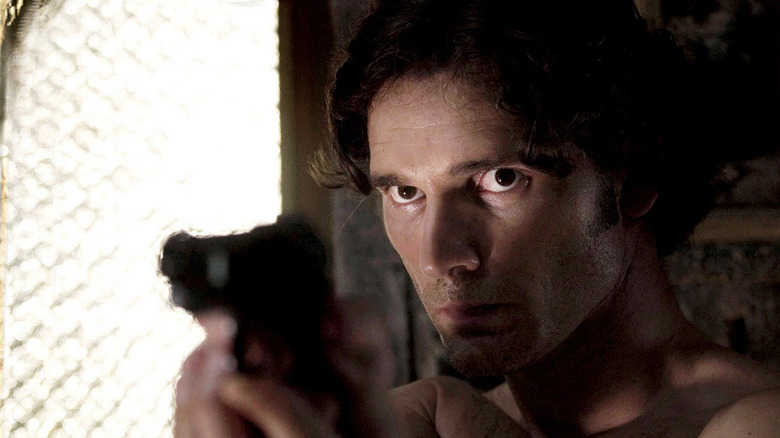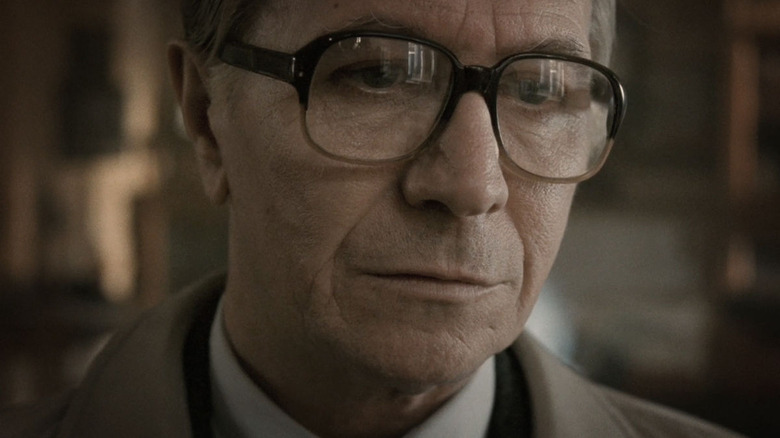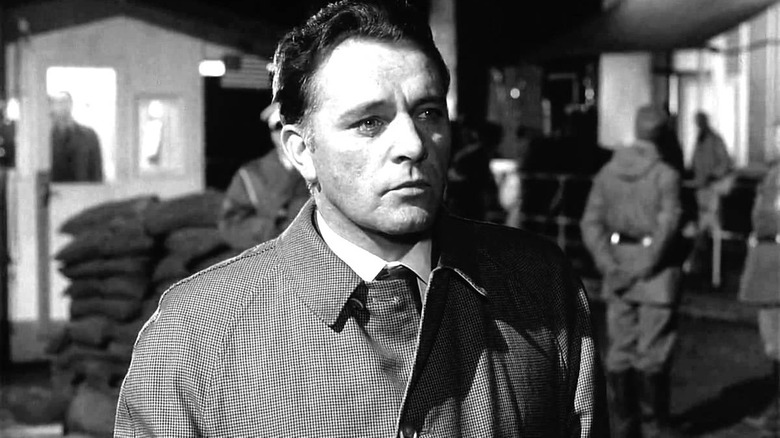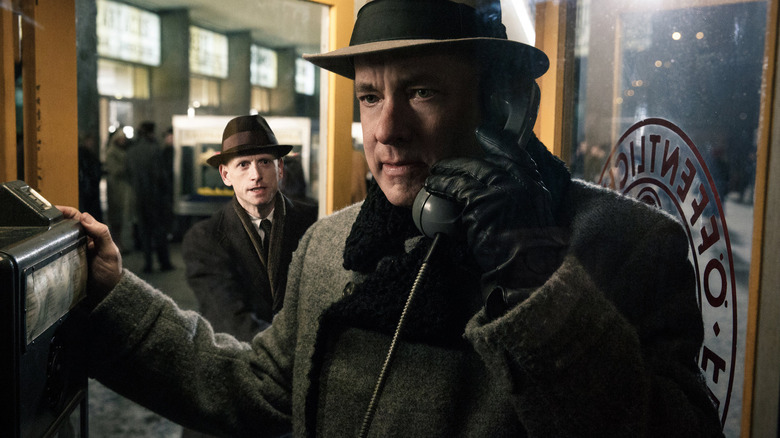Underrated Spy Movies You Need To Watch
Moviegoers know plenty about action heroes like James Bond and Jason Bourne, but theirs aren't the only films worth watching in the espionage genre. Spy movies have been around for almost as long as people have been making feature films, and there are far fewer popular ones than there are ... less popular ones. Of course, that doesn't necessarily mean an underrated spy movie isn't good; maybe it just hasn't developed a massive audience like 007.
Over the decades, Hollywood has unleashed a plethora of films centered around clandestine operatives working to save the world while defeating the bad guys and getting no credit for their actions. That's the life of a spy, and like their protagonists, many spy movies haven't gotten much attention, leaving many unknown to the masses. There are spy movies that did well with critics, but few people saw them, and there are many that flew under the radar due to a shoddy release and lousy marketing.
There are also tons of spy films that are extraordinary award-winning masterpieces of filmmaking, some of which are found below. Many don't appeal to the masses for various reasons, perhaps because they boast fewer action sequences than traditional espionage flicks. Many of the films on this list are exceptional, yet they've fallen victim to the shadow of big-budget movies and the fading memories of their audiences.
The Saint (1997)
"The Saint" features Val Kilmer as the eponymous master thief, who finds himself caught up in the world of international espionage when he's hired to steal a scientific formula. The formula offers the answer to cold fusion, and it's the brainchild of Elisabeth Shue's Dr. Emma Russell. The Saint is the moniker for Simon Templar, whose true name is John Rossi. He adopts the names of Catholic saints throughout the film as he creates new disguises to lure people into his various schemes.
The film was commercially successful, but not to a level most studios would prefer. When it was made, the television series it was based upon had been off the air for decades. In fact, the character of Simon Templar first appeared in the 1920s via Leslie Charteris' book series. Kilmer's adaptation wasn't the first film centered around the character, as he'd been the subject of numerous films throughout the mid-20th century. There were also multiple television series (including one with future 007 Roger Moore) and a radio show starring none other than Vincent Price.
"The Saint" has not been universally beloved by critics despite the charisma of its star. Kilmer shifts through a dozen disguises in the movie, giving him the opportunity to play 12 different characters. Each is brilliantly portrayed, and while "The Saint" has its fans, it's an underrated movie that should have fared better with critics upon release. Interestingly, the franchise is on tap for a reboot, though it's been in the works for a long time (per The Hollywood Reporter).
The King's Man (2021)
"The King's Man" is the third film in the "Kingsman" franchise, based on the comic series by Mark Millar and Dave Gibbons. While the first two films take place in the present, the third is a prequel set during the lead-up to World War I. "The King's Man" details the founding of the clandestine agency featured in the previous movies, following Ralph Fiennes' Orlando, the Duke of Oxford, as he works to undermine a cabal behind the events that started a global conflict.
The movie has some pacing issues that space out action scenes farther apart than some viewers may have liked, but that doesn't stop "The King's Man" from being engaging and entertaining. The prequel went unnoticed by many due to the COVID-19 pandemic, which saw the film's original November 2019 release pushed to December 2021. It also didn't help that "The King's Man" continued the franchise trend of producing films the critics loathe more with each entry. Still, audience scores remain high, so don't let the reviews scare you away, particularly if you enjoyed "Kingsman" and its sequel.
The Company You Keep (2012)
Robert Redford directs and takes the lead in 2012's "The Company You Keep," which is centered around Nick Sloan, a former activist who helped found the Weather Underground. Sloan has been wanted by the FBI for more than 30 years, so he's been living as Jim Grant, a widower and father. Sloan's world is rocked when a reporter uncovers the truth of who he is, and he's forced to once again go into hiding. He finds some of his old pals in the Weather Underground and fights to keep Jim Grant alive as his past catches up to him.
"The Company You Keep" was released to little attention in 2012. Everything in the movie, from the characters and plot to the setting and direction by Redford, was exceptional, but few people saw it in theaters. It didn't earn much money, managing to pull in $20 million. While that would seem like a terrible total for most movies, it's a strong profit for one made on a budget of $2 million (per The Wrap). Still, it's a smaller audience than a Robert Redford movie deserves.
Initial reaction from critics at the Venice Film Festival was favorable, but after release, perspective shifted negatively. David Bax of Battleship Pretension wrote, "It ultimately settles, like many of its characters did, for pleasant mediocrity." Still, others had plenty of praise, including Debbie Lynn Elias of Behind the Lens, who offered a list of compliments: "Intelligent. Thoughtful. Reflective. Powerful. A 'Must See' film for the generations."
All the Old Knives (2022)
"All the Old Knives" is a spy film unlike any other, as it's primarily centered on the aftermath of a terrorist attack rather than the prevention of one. The film opens with a hijacking sequence before transitioning to a series of conversations within various intelligence agencies about what happened and what can be done to prevent a recurrence. The action in the movie is centered around Chris Pine's Henry Pelham, a CIA agent who failed to stop a similar hijacking in 2012. Pine perfectly portrays the overwhelming guilt felt by his character in what is one of his most emotional performances to date.
The movie was released only briefly in theaters, as its primary platform was Amazon Prime. When it hit the streaming service in April 2022, JoBlo reported that 637,000 households watched the movie. Unfortunately, it doesn't appear that many enjoyed it, as it hasn't fared well with audiences. Despite this, critics have absolutely lauded "All the Old Knives" from the beginning. It's been praised for the elevated suspense and old-school handling of the spycraft genre (per Otros Cines).
Despite the critical acclaim it received, it remains an underrated spy thriller that any fan of the genre should see. Pine's on-screen chemistry with Thandiwe Newton, who plays his former lover, is exceptional. Additionally, the dialogue-driven plot is riveting and rewarding. There isn't as much engrossing action as in other films in the genre, but that shouldn't turn anyone away from an engaging movie featuring brilliant performances and a thought-provoking plot.
Our Kind of Traitor (2016)
Ewan McGregor takes the lead in "Our Kind of Traitor" as Perry MacKendrick, a British citizen who finds himself embroiled in espionage while on vacation in Morocco with his wife. He's given a USB drive by a Russian Oligarch who pleads with him to take it to MI6. He's soon recruited into an operation that forces him into the world of international intrigue. The danger is ramped up to 11 as the stakes are raised, and MacKendrick becomes more involved in an operation that could see everything in his life destroyed.
"Our Kind of Traitor" continues the tradition of throwing someone outside the world of espionage into it in full force. It's not the only film on this list to rely on that trope, as it's a common way of instilling a sense of "that could be me" in the viewer. This film manages it brilliantly, which is largely due to the inimitable Ewen McGregor's incredible talent. Variety described McGregor as "the Jimmy Stewart-like everyman," and he's hardly the only high-profile actor in the movie, which also features outstanding performances by Stellan Skarsgård and many others.
The film has been both praised by critics and derided by audiences since its release. Stephen Romei of The Australian called it "an intriguing character study embedded in a spy thriller." But if box office results tell us anything, it's that "Our Kind of Traitor" wasn't beloved by audiences — according to BoxOfficeMojo, it earned only $10.7 million.
The Man From U.N.C.L.E. (2015)
"The Man From U.N.C.L.E." is set at the height of the Cold War, when the U.S. and USSR were on the brink of nuclear annihilation. Henry Cavil plays CIA agent Napoleon Solo, a man who must put the differences he and his country have aside as he teams up with Armie Hammer's KGB agent Illya Kuryakin. Both men unite to take on a criminal organization intent on using nuclear weapons to force the two largest nations into a conflict that threatens the entire world.
"The Man From U.N.C.L.E." is a movie that languished in development hell for years before finally reaching the silver screen (per Den of Geek). It was being worked on in the early '90s and had numerous talents attached to it over the years. When development began, the television series that inspired it had been off the air for 25 years. Add to that the additional 22 years of development, and you're going to end up with an adaptation that doesn't exactly have a dedicated fan base running to theaters.
While that makes sense, "The Man From U.N.C.L.E." should have been marketed better. Had that happened, more people would have gone to see what amounts to an incredibly entertaining movie. The film didn't make a ton of cash, seemingly ensuring there wouldn't be a follow-up. Still, there has been talk of a sequel, with most of the original cast and crew voicing an interest in the project (via CinemaBlend) — not that the many recent controversies surrounding Hammer don't complicate matters further.
Anthropoid (2016)
"Anthropoid" is a spy thriller based on a true story, centered on the World War II operation of the same name. Operation Anthropoid was a mission launched to assassinate SS General Reinhard Heydrich, the principal architect of the Final Solution and the third in command of Hitler's Nazi regime. The film begins in 1941 and focuses on two agents of the former Czechoslovak government-in-exile, Jozef Gabčík (Cillian Murphy), and Jan Kubiš (Jamie Dornan). What follows is a mission to kill Heydrich, followed by an attempted escape and a fierce battle.
Because it's based on historical accounts of the operation, much of "Anthropoid" is grounded in reality. Still, the filmmakers take artistic license in some areas, which doesn't detract from the overall story and historical account. Murphy and Dornan play their characters brilliantly, and the accompanying cast is exceptional. Geoffrey Macnab of The Independent called the movie "a grueling but well-made thriller," and that's an apt description of "Anthropoid" if there ever was one.
Despite the favorable critical response, "Anthropoid" is a film few people have seen. It was a financial flop at the box office, earning only $5.2 million on a $9 million budget. It's significantly underrated and easily one of the best movies on this list.
Operation Avalanche (2016)
Director Matt Johnson takes the helm of "Operation Avalanche," a found-footage film inspired by one of the most prominent conspiracy theories in recent American history (via Rolling Stone). The movie centers around four CIA Agents played by Matt Johnson, Owen Williams, Andy Appelle, and Jared Raab, as they infiltrate NASA as a documentary film crew in 1967. Their goal is to find the identity of a Russian mole, but they soon discover that the mole isn't the problem. NASA's planned mission to the moon is in jeopardy, and the only way to beat the USSR to a moon landing is to fake it.
They begin Operation Avalanche as they produce clips to fake the eventual lunar landing. Things heat up as the mole is uncovered. A significant threat is made to the Apollo 11 rocket, leading the spies to scramble to save their lives as America saves face by landing on the moon via some doctored footage and faked radio signals. While this movie is a work of fiction, it does a fantastic job of interweaving historical events into the conspiracy narrative in a realistic and believable way.
The critical response to "Operation Avalanche" was positive, with many praising the story. Barry Hertz of Globe and Mail wrote, "Part mockumentary, party black comedy, part action-adventure, and part cinematic dare, the movie is a bizarre, engrossing creation that will leave audiences either delighted or baffled, though never bored."
Haywire (2011)
Gina Carano plays black ops soldier Mallory Kane in her first leading role in "Haywire." Kane is betrayed by the people she works for and must run for her life after she's targeted for assassination, setting out to unravel a conspiracy, save her own life, and clear her name. Carano is joined by a lot of talent, including Michael Douglas, Antonio Banderas, Channing Tatum, Bill Paxton, Ewan McGregor, and Michael Fassbender, in one of Steven Soderbergh's most underrated films.
"Haywire" suffered from several issues throughout its production, which forced a delay after changing distributors (per Variety). Soderbergh fought with the studio over his desire to tell a thrilling espionage story interspersed with realistic fight scenes. Fortunately, Soderbergh was able to implement his vision for the film, delivering an exciting and well-crafted tale once the distribution rights were sorted. Critics like Rolling Stone's Peter Travers have praised the movie and Carano's leading turn.
"Haywire" failed to bring in a sizeable audience at the box office, making it a financial flop. Still, "Haywire" is an entertaining story featuring a powerful woman in a role typically given to male leads. It's an entertaining entry in the action-thriller spy genre and one any fan should take the time to watch.
Kill the Messenger (2014)
Jeremy Renner plays former San Jose Mercury News reporter Gary Webb in "Kill the Messenger," which is based on Webb's book, "Dark Alliance: The CIA, the Contras, and the Crack Cocaine Explosion." The film is based on the real-life story of Webb uncovering the truth behind the U.S. Government's funding of Nicaraguan Contras through drug running (via The Wrap). The story was one that shook the very foundations of the government, but it didn't find its way easily to the public — Webb was shunned by his peers and threatened by the CIA over his insistence on reporting the story to the American people.
Jeremy Renner's portrayal is one of the best and most emotional performances of his career. Webb's story is one that hasn't gotten much attention from Hollywood, and "Kill the Messenger" is a solution to that lapse in coverage. The aptly-named movie takes plenty of poetic license with the facts, but it does so in a way that it delivers an exciting and engaging film. The way Webb's world falls apart as he sticks to his journalistic integrity is heartbreaking and passionately portrayed, amounting to a great deal of critical acclaim.
While the movie has been regarded highly by critics and audiences alike, it (much like Webb's own story) hasn't gotten enough attention. "Kill the Messenger" was a financial flop, earning only slightly more than it cost to produce. It's definitely worth checking out, both to learn about an important true story and to see one of Renner's best performances.
Burn After Reading (2008)
Joel and Ethan Coen have given the world a plethora of stylistic films crossing a wide range of genres throughout their careers. "Burn After Reading" is one of their masterpieces, and it's as strange and unusual as most of their films. At the center of the movie is a cache of intelligence documents lost by a recently fired CIA analyst (John Malkovich). Those documents are worthless — simply a draft of a memoir — but that hardly matters when they're found by a pair of gym employees (Brad Pitt and Frances McDormand) who are convinced they've stumbled upon a matter of national security. They undergo a series of misadventures as they embark on a moneymaking scheme that casts them into a complex yet completely pointless web of intrigue.
Like most of the Coens' filmography, "Burn After Reading" has been lauded by critics and nominated for dozens of awards, winning several. The film is overtly ridiculous in its portrayal of U.S. Intelligence operatives as they're cast beside the idiocy of the main characters. In an interview with Entertainment Weekly, Pitt explained, "I said to [the Coens], 'I don't know how to play this; I mean, he's such an idiot.'" While his concerns were valid (his character is indeed a moron), Pitt manages it perfectly in one of his funniest performances to date.
"Burn After Reading" is one of those movies that did very well upon release, and it enjoyed a sizable audience. Despite this, it seems like it's been largely forgotten by the masses in the years since. Still, GQ called it prophetic, and it's more worth checking out than ever.
Enemy of the State (1998)
"Enemy of the State" was unlike any Will Smith vehicle that had come before, and it solidified him as one of the spy thriller genre's headliners. The film follows Smith's Robert Clayton Dean after he inadvertently attracts the suspicions of corrupt NSA official Thomas Brian Reynolds (Jon Voight). What follows is Dean's struggle to save his life as the full force of the National Security Agency is employed against him in his desperate struggle to prove his innocence.
"Enemy of the State" is all about the fear that those in government will abuse the power given to them for their personal gain. It's a fear many people have, which is why the movie appealed to the masses. Of course, it takes considerable artistic license with the capabilities of the agency and its ability to exploit a single American citizen (per BuzzFeed News). Despite this, director Tony Scott manages to create a compelling action movie featuring all the twists and turns a spy thriller can throw at Smith's everyman character.
While the movie did well at the box office upon release and helped elevate Smith's career to a level that made it possible for him to lead "Ali" a few years later, it's faded over time. Since its release, "Enemy of the State" has been buried by the likes of "The Bourne Identity," "Taken," and many others. That said, as Andscape points out, it's since become a prescient example of government corruption that seems all too real in the 2020s.
Confessions of a Dangerous Mind (2002)
George Clooney made his directorial debut with "Confessions of a Dangerous Mind." The film is centered around a fictional portrayal of real-life game show host and producer Chuck Barris. The movie is based on Barris' book of the same name, subtitled an "unauthorized autobiography." It portrays Barris as a CIA assassin who used his job as the host of "The Dating Game" to travel around the globe and kill people.
Barris' life has several ups and downs, including the incredible success he gained with "The Gong Show." Still, it's his private life that proves difficult. "Confessions of a Dangerous Mind" is easily one of the strangest espionage films ever made, and that has a lot to do with the source material. There's no actual evidence Barris was a CIA assassin, and while the organization denies his involvement, that's what it would do whether he was or wasn't (via Time). Regardless, the film is elevated by Sam Rockwell's portrayal of Barris.
Rockwell somehow makes the whole thing seem believable despite the extraordinary events of the plot. He consistently outperforms himself, and "Confessions of a Dangerous Mind" is only one of many brilliant roles the actor has mastered over the years. The film was a critical success, but like many on this list, it's been largely forgotten.
The Courier (2021)
In "The Courier," Benedict Cumberbatch plays Greville Wynne, a British businessman with no connection to espionage whatsoever. That changes when he's recruited by the CIA and MI6 to act as a courier to transfer information between the clandestine organizations and Oleg Penkovsky, a high-ranking official in the USSR and a GRU officer. Wynne is recruited because he's an ordinary businessman who won't be viewed as suspicious as he enters the Soviet Union on business trips. His activities eventually cause problems in his marriage, and the growing tension between the U.S. and USSR grows via the Cuban Missile Crisis.
Eventually, Wynn is arrested and Penkovsky is charged with treason. Wynn is finally released via a prisoner exchange for a Russian spy, and he wastes no time attempting to return to the life he left behind when he decided to become a courier. "The Courier" is based on true-life events around the Cuban Missile Crisis and Wynne's involvement in transferring intelligence between his Russian contact and those who recruited him. The events of the film are based on his life, and it's been lauded for its realistic portrayal (per USA Today).
"The Courier" is a movie that's exceptionally well made. Unfortunately, it didn't receive a great deal of attention upon its release, and not many people have seen it. It's criminally underrated and stands as a fascinating example of the real-world events that impacted everyone involved (via History vs. Hollywood).
The Manchurian Candidate (2004)
2004's "The Manchurian Candidate" stars Denzel Washington as Bennett Marco, a Major in the U.S. Army who became famous following his command during a Gulf War raid in 1991. Liev Schreiber plays Sergeant First Class Raymond Shaw, a soldier awarded the Medal of Honor for his role in the mission who enters the world of politics after the war. The two are thrust back into one another's lives as Bennett's memories of the mission become unclear. He investigates what happened and learns that a powerful company called Manchurian Global is responsible for a widespread conspiracy that transforms soldiers into unwitting assassins.
If the film's plot seems familiar, that's because it's a remake of the 1962 film of the same name. The new "Manchurian Candidate" was updated to better fit with modern times, as Roger Ebert reflected in his review. Still, the overall plot and mechanics of the conspiracy remain pretty much the same. The 2004 film features an all-star cast (like its predecessor), including Meryl Streep, Anthony Mackie, Jeffrey Wright, and many others. It's easily one of Washington's best thrillers. Still, despite the critical acclaim it has received, it doesn't get the attention it deserves.
The main reason "The Manchurian Candidate" is underrated is its predecessor. The original film is widely considered to be one of the best political thrillers ever made, and it has the award nominations to back that up. It easily outshines the more recent adaptation of Richard Condon's 1959 novel, and that's unlikely to change anytime soon. Ultimately, it's an entertaining film people should see without comparing it to its predecessor.
Munich (2005)
Steven Spielberg's "Munich" depicts the aftermath of the 1972 Munich massacre. This was an attack carried out by eight members of the terrorist group Black September, which saw nine members of the Israeli Olympics team taken hostage. As the attack escalated and a rescue attempt failed, six Israeli coaches and five athletes were killed. The event spurred members of the Mossad to launch Operation Wrath of God, targeting those responsible for the attack.
Spielberg masterfully directs an all-star cast consisting of Eric Bana, Daniel Craig, Geoffrey Rush, and many more. The film was praised around the world, but many took umbrage with the depiction of the Israeli agents having second thoughts about their actions. (per Newsweek). In the end, only those involved truly know what happened, but that doesn't change the fact that Spielberg's "Munich" is one of his most ambitious and exciting movies ... and that's saying something.
Upon release, "Munich" did incredibly well, as most Spielberg films do. That said, the movie was released in 2005 and hasn't built a large following in the vein of the director's more successful films. As a result, like many others on this list, it's fallen by the wayside and lapsed from viewers' minds as popular culture has moved on to other things.
Tinker Tailor Soldier Spy (2011)
"Tinker Tailor Soldier Spy" is the second adaptation of John le Carré's 1974 novel of the same name. The first was a BBC production starring Alex Guinness, released in 1979. This updated version doesn't throw the story into a new modern setting, as it depicts the events of the book set in the 1970s. The film is centered around Gary Oldman's George Smiley, a recently retired member of British Intelligence. He's brought back to uncover a mole at the top of the organization, and the film delves into the complexity of the situation splendidly.
The film features an incredibly prestigious cast, including Tom Hardy, Colin Firth, Mark Strong, Benedict Cumberbatch, John Hurt, and many more. "Tinker Tailor Soldier Spy" is an excellent example of complex storytelling that remains relevant and engrossing to a broad audience, and the critics lauded it upon release. It didn't do badly at awards season either, having earned three Academy Award nominations and dozens of others, many of which it won.
Arguably, "Tinker Tailor Soldier Spy" isn't underrated; rather, it's simply unknown to many. The film did well at the box office, earning nearly three times its budget. Unfortunately, that amounts to a little more than $24 million in the U.S. and $57 million overseas. Despite the film's masterful handling of the subject matter, it didn't pull in audiences in a year dominated by "Harry Potter," "Transformers," "Twilight," and the Marvel Cinematic Universe.
The Spy Who Came In from the Cold (1965)
There are hundreds of excellent spy movies from the 20th century, many of which were fueled by the Cold War and other global conflicts. One of the best of the era was 1965's "The Spy Who Came In from the Cold," starring Richard Burton as Alec Leamas, a British MI6 agent who's kicked out of the organization and becomes an alcoholic. But in fact, it's all a ruse designed gain the trust of the East German operatives who buy his secrets. The validity of those secrets becomes an issue, but his mission isn't over with that revelation — it's just beginning.
"The Spy Who Came In from the Cold" is a fantastic story told through brilliant filmmaking that earned the production four BAFTA Awards and many additional honors. The movie is easily one of the best of the genre, and it was, in no way, underrated upon its release in 1965. Unfortunately, the reality of time and the plethora of films that followed have pushed the public's attention away from this and many other engaging movies detailing spycraft and the people who work in the shadows.
Modern audiences are sadly missing out on numerous movies from the era, and "The Spy Who Came In from the Cold" is one such example. It's not so much underrated as it is all too forgotten in the 21st century. More than 50 years after it wowed audiences, the movie deserves a comeback, as it truly does stand the test of time.
Bridge of Spies (2015)
Tom Hanks takes the lead in Steven Spielberg's 2015 Cold War spy film "Bridge of Spies." The movie tells the real-life story of James B. Donovan, an attorney hired to defend an accused Soviet spy in court (per History vs. Hollywood).
The spy in question, Rudolf Abel, was arrested in 1957, and Donovan does his best to prove his client's innocence but fails. He argues that the death penalty should be avoided in favor of a future prisoner exchange, and that's precisely what happens after Gary Powers' U-2 is shot down over the USSR in 1960. Donovan then works with the CIA, the organization he rebuffed during the trial, to ensure the exchange takes place on Glienicke Bridge. The film gets its name from the bridge which connects Potsdam with Berlin, a preferred spot for prisoner swaps during the Cold War.
Like "Munich," "Bridge of Spies" is another brilliant thriller from Spielberg. It was recognized by the Academy with six Oscar nominations, so calling it "underrated" might seem odd. Still, it's an example of an exceptional movie that hasn't achieved the level of success it deserves. Whether it was due to a general disinterest in the subject matter or something else entirely, the audience that found "Bridge of Spies" was small compared to Spielberg's other films — it did well financially, but a $72 million domestic box office pull is pretty small by his standards.
